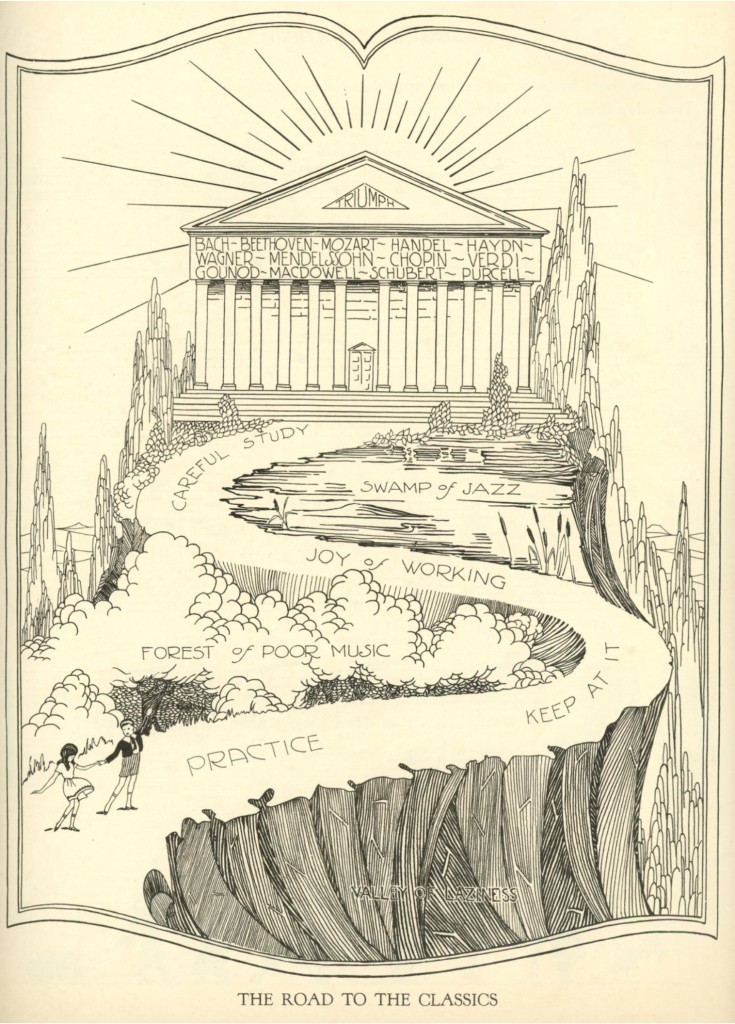Full disclosure, kind readers: during my public school years I was an unalloyedly precocious rapscallion with a big sense of humor (to myself, anyhow), a bigger attitude, and an unassailably huge mouth…(go ahead, snicker and take your aside: “so, what’s changed?”). My pediatric dentist, with either a sense of pity or irony, told my mom I had a “large mandible.” Most of my misbehaving surrounded music class. For example, I was the first second grader in my school’s history to be expelled from chorus. Even then bowing at the altar of St. Spike (Jones), I “woof, woofed” during rehearsal after the line “when the dog bites” as we doggedly plowed through “My Favorite Things.” Mrs. Hahn sent me to the principal, who forbade me to set foot in the music room at any point she was in there. Metaphorical restraining order firmly in place, he offered me to the school librarian during chorus, igniting the embers of my passion for reading. Mrs. Hahn left her position under a year later (a happy event in which I had no hand…honest…).
Replacing Mrs. Hahn was Mr. Forrest, a dandruff-laden orb of a fellow who insisted on singing everything. “Good morning, you boys and girls,” he’d warble like a cantor in search of a synagogue, and we’d dutifully copy his melody: “Good morning, Mr. Forrest.” I soon realized he had perfect pitch. What better way to torment him than sing a half-tone flat or sharp against the other students? (I didn’t yet know the term “minor second” but intuited by his grimaces it wasn’t a pleasing interval.) It took me two years to get rid of him…
In middle school, I did my best to keep my band teacher, Ms. Boppert, around as I had a serious crush on her. She was great with the students. We weren’t a terrific ensemble of 40-50 but we had fun and she had our undying loyalty. She even forgave me the day I couldn’t resist answering her customary baton-wielding imperative, “Eyes up here, eyes up here!!”—situated as I was in the trombone section on the third tier of risers—with the response, “That’s right! And we’s up here!!” [NB: This story, using a mild dialect, is not P.C. by any means, but all creeds, colors, and ages had a right good guffaw over it—most mercifully including my hot middle-school fantasy).
Finally, Ms. Boppert did leave teaching…this time, not because of me. She got married (CURSE the scum) and off she repaired. Livid, I was extra awful to Mr. Fordyce, her hapless replacement, who like a similarly named, though implausibly less rotund character we’ve already met, sang (for a brief time) everything that really should simply be said. In timing that was undoubtedly coincidence, shortly after a poignant incident he left for the priesthood. In detention one day, I gave my friend Eddie a bag of Twizzlers left over from lunch if he’d make a paper airplane and shoot it towards Mr. Fordyce while shouting “747 heading for a wide body!” We didn’t get suspended, but we also didn’t see the outside of school during lunch break for the rest of the school year, and this happened in September.
I share these lurid tales not to illustrate how obnoxious I was, although that apprehension is a natural result of your having read (as well as my having written) them. Rather, I’ll continue this reminiscence by briefly sharing the story of—and my relationship with—the person who annihilated me when I entered Connecticut College in 1985: an octogenarian Polish spinster named Zosia Jacynowicz.
Miss Jacynowicz was part Pótnocnica (Lady Midnight in Polish folklore), Frau Blücher (no explanation required), and part the wise and wizened surrogate Grandma next door, rolled up into a woman to whom all students and faculty veritably genuflected. I say she was in her 80s but I truly have no idea how old she was; I know she became a member of the Music Faculty in 1943. I found a review of a solo recital she performed (all Chopin and not a lightweight piece among them) in a digitized copy of the (then) school paper from Nov. 1949. Five years later, she is listed in the same publication as faculty and her solo recital contained Mozart, Schubert, Beethoven (the Waldstein Sonata), Debussy, and more Chopin; so successful were her performance and teaching careers at CT. College that she’s listed in the November 1954 issue of The International Musician as having been suspended from the Boston, MA, Local 9 chapter of the A.F.M. My online research revealed that she studied at the Longy School of Music in Cambridge, MA, on a Jahn-Beer scholarship, and while there studied with Nadia Boulanger and Boris Goldowsky, as well as having played with both the Boston Pops and Esplanade Orchestras. What wasn’t mentioned anywhere, and what she repeatedly confided to me, was that she was also one of Paderewski’s students in the early 1930s; she used to lay her head on his knee as he played for her after her lesson.

In autumn 1985, I arrived at my home for the next four years having performed in front of audiences on average 4-5 nights a week for the previous four, so I thought I was hot stuff. Upon learning that there would be auditions (juries, they called them) for placement with a professor of one’s chosen instrument AND that they would be free (subsidized by a generous endowment), I thought, “OK, I already know how to play the piano; maybe it’s time to try and become a pianist” and immediately signed up for a slot that afternoon. While concentrating on performing and increasing my repertoire, I’d left off crucial elements like scales and arpeggios and such, despite my teacher Jay Hickerson’s admonishment that I’d regret it one day…This day was to be that day.
I sat in the waiting room, hearing a parade of students playing Beethoven, Chopin, Liszt, and Rachmaninoff—many extremely well. No way was I going to be able to get through any “proper” piece except perhaps the first section of “Fur Elise”—and Elise would have rejected the gift—so I was sweating about what to do. I swaggered into the room and was confronted by a jury of Professor Paul Althouse (a brilliant man whose sensitivity and passion for musical beauty remains unparalleled), Professor John Anthony (an extremely gifted organist, and I’m proud to say remains a good friend who—still—truly believes music died when J. S. Bach did) and…herself.
I sat down, made a big show of cracking my knuckles, and launched into a version of something I made up on the spot: “Fantaisie Sur En Attandant Pour le Robert E. Lee.” Three minutes and untold hundreds of thousands of notes later, I crashed to a thunderous ending, pretty much sinking the ship. Profs. Althouse and Anthony had their lower jaws resting on their desks in a potent mixture of disbelief and dismay. Awkward eons of silence ensued. Miss Jacynowicz whispered with a papery voice: “Very impressive young man. NOW, do it again and switch hands throughout.” OMG ~ I was doomed. Yet no other professor would come near me and she took me on.
She started me with Bach two-part Inventions that I took to mean you could play the right hand (part 1) and then the left (Part 2). Wrong.
She demanded I spend hours a day on scales and arpeggios, trills and turns…I didn’t.
In frustration after almost eight months of weekly lessons, she demanded to know why I was such a sloven wasting her time. I confessed that I was gigging when possible, which meant traveling around New England with little time for piano practice if I was also going to keep my course grades up.
“Gigging,” she spat the word, “meaning what, exactly?”
“Playing engagements for money,” I replied.
“What kind of music?” she demanded.
“Er…jazz..!…?…!”
Whereupon she went to her desk, ripped a yellowed page off the wall behind it, and plunked it down in front of me. Rather than describe it in full (it appears here), I’ll point out the pride I felt that if I were to overcome the pitfalls of “The Valley of Laziness” and “The Forest of Poor Music” by adhering to the principles of “Practice,” “Keep[ing] at it,” the “Joy of Working,” and “Careful Study,” my final hurdle before reaching the Exalted Temple of Triumph where the greats awaited was “The Swamp of Jazz!!”
I turned to her and declared, with all the considerable respect and awe she deserved, “Madam, I am and shall ever be a creature of the swamp!” and departed her studio.
My formal tutelage over, I continued to spend time with her, hearing her stories, listening to her play, going twice weekly over to her third-floor apartment in faculty housing across the highway from the college to take out her garbage, and both sneeze at and be tripped up by—and always at the top of the three-flight staircase—her six cats. Several hundreds of pounds of spilled garbage (and spilled me) later, I was finally able to impress her by playing a Harlem Stride version of Chopin’s Nocturne in Eb.
She winked at me and said “Ignacy would have loved that; Frederic would have loathed it.”
I turned to her and asked, “And you?”
(lengthy pause)
“Now, switch hands.”
Jeff Barnhart is an internationally renowned pianist, vocalist, arranger, bandleader, recording artist, ASCAP composer, educator and entertainer. Visit him online atwww.jeffbarnhart.com. Email: Mysticrag@aol.com























